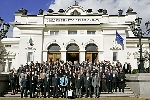News
National Assembly Ratifies the Treaty of Lisbon
21/03/2008
National Assembly passed the Ratification Act on the Treaty of Lisbon amending the Treaty on European Union and the Treaty establishing the European Community on its sitting, 21 March 2008. The ratification was endorsed by 195 parliamentary members, 15 voted against.
The discussion took almost 5 hours. Representatives from all parliamentarian groups took the floor. The debates were broadcasted by the Bulgarian National Radio and National Television.
The official sitting was attended by the President of the Republic of Bulgaria Georgi Pirinski and Prime Minister Sergey Stanishev,
Council of Minister’s members, high magistrates, members of the Constitutional Court, and leaders of state institutions and representatives of different religious denominations in Bulgaria. Guests from the Diplomatic corps, Trade union representatives and Media editors in chief were also present.
According to the Treaty of Lisbon there will be seven institutions in the European Union – European Parliament, Council of the European Union, European Council, European Commission, European Court of Justice, European Central Bank and European Court of Auditors.
EU would choose a President for a term of two and a half years with the possibility to extend his mandate once. He will preside over the Council of the European Union. The Treaty expands the scope of the Council’ activities and the number of acts to be passed with a qualified majority instead of unanimous vote.
The right of the national parliaments to intervene directly into the European legislative process is guaranteed.
A new position of a High Representative for the Common Foreign and Security Policy in the Union is introduced. He will be at the same time Deputy Chairman of the Foreign Relations Committee. The number of the commissioners in the European Commission will be decreased.
The European Court of Justice will be entitled with new competencies, mainly on matters of police and penal law cooperation between the member countries.
The discussion took almost 5 hours. Representatives from all parliamentarian groups took the floor. The debates were broadcasted by the Bulgarian National Radio and National Television.
The official sitting was attended by the President of the Republic of Bulgaria Georgi Pirinski and Prime Minister Sergey Stanishev,
Council of Minister’s members, high magistrates, members of the Constitutional Court, and leaders of state institutions and representatives of different religious denominations in Bulgaria. Guests from the Diplomatic corps, Trade union representatives and Media editors in chief were also present.
According to the Treaty of Lisbon there will be seven institutions in the European Union – European Parliament, Council of the European Union, European Council, European Commission, European Court of Justice, European Central Bank and European Court of Auditors.
EU would choose a President for a term of two and a half years with the possibility to extend his mandate once. He will preside over the Council of the European Union. The Treaty expands the scope of the Council’ activities and the number of acts to be passed with a qualified majority instead of unanimous vote.
The right of the national parliaments to intervene directly into the European legislative process is guaranteed.
A new position of a High Representative for the Common Foreign and Security Policy in the Union is introduced. He will be at the same time Deputy Chairman of the Foreign Relations Committee. The number of the commissioners in the European Commission will be decreased.
The European Court of Justice will be entitled with new competencies, mainly on matters of police and penal law cooperation between the member countries.

Latest news
- 22/04/2021
The Parliament imposed a moratorium on concessions, real estate deals and appointments pending the election of a new cabinet or caretaker government - 16/04/2021
By 156 votes “in favour”, the National Assembly accepted the resignation of the Council of Ministers with Prime Minister Boyko Borisov - 15/04/2021
Speech by Mrs. Iva Miteva upon her election as a President of the 45th National Assembly - 15/04/2021
The Member of Parliament Iva Miteva was elected President of the 45th National Assembly - 15/04/2021
The Members of the 45th National Assembly were officially sworn in - 03/03/2021
The President of the National Assembly Tsveta Karayancheva and MPs attended the solemn fireworks-retreat on the occasion of the Liberation of Bulgaria - 03/03/2021
Every Bulgarian should preserve and honour the memory of those glorious ancestors, thanks to whom Bulgaria exists today, said the President of the National Assembly Tsveta Karayancheva in Gabrovo - 03/03/2021
Today we are on Shipka to pay our respects to all the heroes who sacrificed their lives for freedom, said the President of the National Assembly Tsveta Karayancheva after climbing Shipka Peak together with young people from all over the country - 02/03/2021
The Vice-President of the National Assembly Valeri Simeonov received an award from the Bulgarian Republican Self-Government in Hungary - 26/02/2021
The Parliament adopted at second reading amendments to the Measures Against Money Laundering Act
 Български
Български English
English
